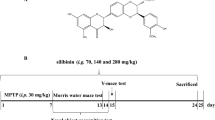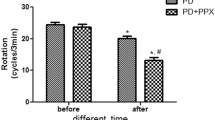Abstract
The cognitive function impairment may be related to the inflammation of the hippocampus in Parkinson's disease. Simvastatin can play a positive role in Parkinson's disease. The purpose of this study was to investigate whether simvastatin could improve behavioral disorders, especially depression, anxiety and cognitive function in mouse PD models, and further explore the molecular mechanism. In the present study, C57BL-6 mice underwent intraperitoneal injection of MPTP (30 mg/kg) once a day for 5 consecutive days. At the same time, simvastatin (10 mg/kg) was pretreated for 2 days before the Parkinson's disease model was established, and then continued for 5 days, and the control group underwent intraperitoneal injection of MK801 (dizocilpine, 0.2 mg/kg) and saline solution. Depression status was tested by a tail suspension test and a sucrose splash test, followed by an open-field test and an elevated plus maze test to determine anxiety levels. Spatial behavior and muscle status were measured with a water maze and a rotarod test. The expression of RNA and protein of N-methyl-d-aspartate receptor subtype 2B (NMDAR2B), nerve growth factor IB (Nur77), cyclooxygenase-2 (COX-2), and tumor necrosis factor (TNF) α were assayed by real-time polymerase chain reaction and Western blot. Our results showed that simvastatin can improve the cognitive function, anxiety, and depression of PD mice with MPTP injury. Simvastatin reversed the NMDAR2B increase, restored Nur77 downward, and reduced the expression of COX-2 and TNF-α in MPTP-treated mice. This role of simvastatin was consistent with MK801 in increasing the expression of Nur77 and inhibiting NMDAR2B and cytokines in MPTP-lesioned PD mice. These findings suggest that reversed the NMDAR2B increase, restored Nur77 downward, and reduced the expression of COX-2 and TNF-α in MPTP-treated mice may be one of the mechanisms that simvastatin improves cognitive functions, depression, and anxiety in MPTP-lesioned mice.






Similar content being viewed by others
Abbreviations
- PD:
-
Parkinson's disease
- MPTP:
-
1-Methyl-4-phenyl-1,2,3,6-tetrahydropyridine
- 6-OHDA:
-
6-Hydroxydopamine
- MPP+ :
-
1-Methyl-4-phenylpyridine
- TH:
-
Tyrosine hydroxylase
- COX-2:
-
Cyclooxygenase-2
- TNF-α:
-
Tumor necrosis factor alpha
- Nur77:
-
Nerve growth factor IB (NGFIB) also known as NR4A1
- NMDA:
-
N-methyl-d-aspartic acid
- NMDAR2B::
-
N-methyl d-aspartate receptor subtype 2B, also known as NR2B
- UPS:
-
Ubiquitin–proteasome system
References
Aarsland D, Påhlhagen S, Ballard CG, Ehrt U, Svenningsson P (2012) Depression in Parkinson disease-epidemiology, mechanisms and management. Nat Rev Neurol 8:35–47
Bai S, Song Y, Huang X, Peng L, Jia J, Liu Y, Lu H (2016) Statin use and the risk of Parkinson's disease: an updated meta-analysis. PLoS ONE 11:e0152564. https://doi.org/10.1371/journal.pone.0152564
Barcia C et al (2011) IFN-γ signaling, with the synergistic contribution of TNF-α, mediates cell specific microglial and astroglial activation in experimental models of Parkinson's disease. Cell Death Dis 2:e142
Baytan SH, Alkanat M, Okuyan M, Ekinci M, Gedikli E, Ozeren M, Akgun A (2008) Simvastatin impairs spatial memory in rats at a specific dose level. Tohoku J Exp Med 214:341–349
Chao LC et al (2012) Skeletal muscle Nur77 expression enhances oxidative metabolism and substrate utilization. J Lipid Res 53:2610–2619. https://doi.org/10.1194/jlr.M029355
Cui B, Wu M, She X (2009) Effects of chronic noise exposure on spatial learning and memory of rats in relation to neurotransmitters and NMDAR2B alteration in the hippocampus. J Occup Health 51:152–158. https://doi.org/10.1539/joh.l8084
Ehlers MD (2003) Activity level controls postsynaptic composition and signaling via the ubiquitin–proteasome system. Nat Neurosci 6:231–242. https://doi.org/10.1038/nn1013
ElBatsh MM (2015) Antidepressant-like effect of simvastatin in diabetic rats. Can J Physiol Pharmacol 93:649–656. https://doi.org/10.1139/cjpp-2014-0560
Ennaceur A (2014) Tests of unconditioned anxiety-pitfalls and disappointments. Physiol Behav 135:55–71
Hyde LA, Hoplight BJ, Denenberg VH (1998) Water version of the radial-arm maze: learning in three inbred strains of mice. Brain Res 785:236–244
Jackson-Lewis V, Przedborski S (2007) Protocol for the MPTP mouse model of Parkinson's disease. Nat Protoc 2:141–151. https://doi.org/10.1038/nprot.2006.342
Kanzleiter T et al (2010) Overexpression of the orphan receptor Nur77 alters glucose metabolism in rat muscle cells and rat muscle in vivo. Diabetologia 53:1174–1183. https://doi.org/10.1007/s00125-010-1703-2
Lesemann A et al (2012) MPTP-induced hippocampal effects on serotonin, dopamine, neurotrophins, adult neurogenesis and depression-like behavior are partially influenced by fluoxetine in adult mice. Brain Res 1457:51–69
Lim SW et al (2017) Simvastatin therapy in the acute stage of traumatic brain injury attenuates brain trauma-induced depression-like behavior in rats by reducing neuroinflammation in the hippocampus. Neurocrit Care 26:122–132. https://doi.org/10.1007/s12028-016-0290-6
Lu KT et al (2008) Neuroprotective effects of resveratrol on MPTP-induced neuron loss mediated by free radical scavenging. J Agric Food Chem 56:6910–6913. https://doi.org/10.1021/jf8007212
Malloul H, Mahdani FM, Bennis M, Ba-M'hamed S (2017) Prenatal exposure to paint thinner alters postnatal development and behavior in mice. Front Behav Neurosci 11:171. https://doi.org/10.3389/fnbeh.2017.00171
Miyoshi E, Wietzikoski S, Camplessei M, Silveira R, Takahashi RN, Da Cunha C (2002) Impaired learning in a spatial working memory version and in a cued version of the water maze in rats with MPTP-induced mesencephalic dopaminergic lesions. Brain Res Bull 58:41–47
Moretti M et al (2015) Effects of agmatine on depressive-like behavior induced by intracerebroventricular administration of 1-methyl-4-phenylpyridinium (MPP(+)). Neurotox Res 28:222–231. https://doi.org/10.1007/s12640-015-9540-1
Niranjan R (2014) The role of inflammatory and oxidative stress mechanisms in the pathogenesis of Parkinson's disease: focus on astrocytes. Mol Neurobiol 49:28–38
Peruga I, Hartwig S, Thone J, Hovemann B, Gold R, Juckel G, Linker RA (2011) Inflammation modulates anxiety in an animal model of multiple sclerosis. Behav Brain Res 220:20–29. https://doi.org/10.1016/j.bbr.2011.01.018
Raison CL, Capuron L, Miller AH (2006) Cytokines sing the blues: inflammation and the pathogenesis of depression. Trends Immunol 27:24–31
Stanford SC (2007) The open field test: reinventing the wheel. J Psychopharmacol (Oxf, Engl) 21:134–135. https://doi.org/10.1177/0269881107073199
Taylor TN, Greene JG, Miller GW (2010) Behavioral phenotyping of mouse models of Parkinson's disease. Behav Brain Res 211:1–10
Undela K, Gudala K, Malla S, Bansal D (2013) Statin use and risk of Parkinson’s disease: a meta-analysis of observational studies. J Neurol 260:158–165
von Engelhardt J et al (2008) Contribution of hippocampal and extra-hippocampal NR2B-containing NMDA receptors to performance on spatial learning tasks. Neuron 60:846–860. https://doi.org/10.1016/j.neuron.2008.09.039
Yan J et al (2011) Simvastatin prevents dopaminergic neurodegeneration in experimental parkinsonian models: the association with anti-inflammatory responses. PLoS ONE 6:e20945. https://doi.org/10.1371/journal.pone.0020945
Yan J, Sun J, Huang L, Fu Q, Du G (2014) Simvastatin prevents neuroinflammation by inhibiting N-methyl-d-aspartic acid receptor 1 in 6-hydroxydopamine-treated PC12 cells. J Neurosci Res 92:634–640. https://doi.org/10.1002/jnr.23329
Yang Y, Cui Y, Sang K, Dong Y, Ni Z, Ma S, Hu H (2018) Ketamine blocks bursting in the lateral habenula to rapidly relieve depression. Nature 554:317–322. https://doi.org/10.1038/nature25509
Zhang XH, Liu SS, Yi F, Zhuo M, Li BM (2013) Delay-dependent impairment of spatial working memory with inhibition of NR2B-containing NMDA receptors in hippocampal CA1 region of rats. Mol Brain 6:13. https://doi.org/10.1186/1756-6606-6-13
Zhao H et al (2017) Neurochemical effects of the R form of alpha-lipoic acid and its neuroprotective mechanism in cellular models of Parkinson's disease. Int J Biochem Cell Biol 87:86–94
Zhu X et al (2017) Neuronal Nitric oxide synthase contributes to PTZ kindling-induced cognitive impairment and depressive-like behavior. Front Behav Neurosci 11:203. https://doi.org/10.3389/fnbeh.2017.00203
Acknowledgements
We acknowledge that this work was supported by the Natural Science Foundation of Henan Province (18230041033) and National Natural Science Fund (Grant No. U1304809).
Author information
Authors and Affiliations
Corresponding author
Ethics declarations
Conflict of interest
All authors certify that they have no affiliations with or involvement in any organization or entity with any financial interest (such as honoraria; educational grants; participation in speakers’ bureaus; membership, employment, consultancies, stock ownership, or other equity interest; or expert testimony or patent-licensing arrangements) or non-financial interest (such as personal or professional relationships, affiliations, knowledge or beliefs) in the subject matter or materials discussed in this manuscript.
Ethical Approval
This study was approved by the Ethics Committee/Institutional Review Board of the First Affiliated Hospital of Henan University of Science and Technology. All animals were treated in accordance with the guidelines of the NIH’s Guide for the Care and Use of Laboratory Animals and followed the guidelines of the International Association for the Study of Pain (IASP).
Additional information
Publisher's Note
Springer Nature remains neutral with regard to jurisdictional claims in published maps and institutional affiliations.
Electronic supplementary material
Below is the link to the electronic supplementary material.
Rights and permissions
About this article
Cite this article
Yan, J., Liu, A., Fan, H. et al. Simvastatin Improves Behavioral Disorders and Hippocampal Inflammatory Reaction by NMDA-Mediated Anti-inflammatory Function in MPTP-Treated Mice. Cell Mol Neurobiol 40, 1155–1164 (2020). https://doi.org/10.1007/s10571-020-00804-7
Received:
Accepted:
Published:
Issue Date:
DOI: https://doi.org/10.1007/s10571-020-00804-7




